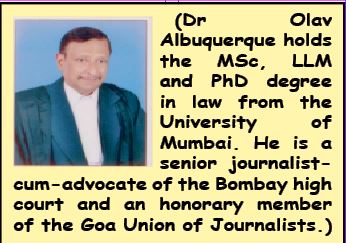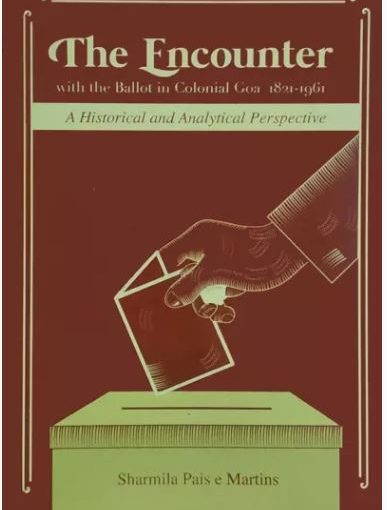By Dr Olav Albuquerque
NOT many may know it but the colonial history of Portuguese Goa from 1861 to 1961 — shows that elections to the Parliament of Portugal were held in Goa for a major part of these 100 years. There were two notable exceptions, which were for five years from 1895 to 1900 and for 19 years from 1926 to 1945. But these were aberrations and not the rule.
Today, when elections in Goa have just been concluded, it is interesting to learn how the very first elections were conducted in Goa under Portuguese rule.
We must confess that not all Goans were deemed to be enfranchised to vote during these elections and it was mostly the landowners who were allowed to vote during these elections, so they could take part in public administration, parliamentary, municipal, parochial, legislative or governing council, colonial council and presidential elections of the Portugal during the period when it was declared a republic.
PORTUGUESE BALLOT
AN in-depth study has been conducted by Associate Professor of History at the St Xavier’s College in Mapusa, Sharmila Pais e Martins, and her PhD thesis has been published in a book titled “The Encounter with the Ballot in Colonial Goa 1821-1961.” This is the very first in-depth study conducted which throws light on a much neglected area of political science.
The book is erudite and sophistic which makes for “heavy” reading. But then all scholarly PhD theses cannot sacrifice accuracy at the altar of simplicity.
Those looking for a breezy, light-as-air novel will be disappointed because the study done by Sharmila Pais e Martins is the last word on how and why Portugal held elections in Goa between 1861 and 1961, after the Indian army forcibly evicted them from Goan soil. Stories of huge bonfires of Portuguese records from the courts and land registers abound, which is a tragedy because those who lit those bonfires did not realize they were destroying a valuable legacy left by the colonial rulers.
During these elections, there was no discrimination on the grounds of caste, religion or domicile, which is remarkable given the fact that black America did not see emancipation of blacks until the 20th century. Of course, there were slaves in Goa brought from Mozambique and Angola beween 1510 and the 1800s. No doubt, these blacks or “hapris” (negroes) as they were called did not enjoy the right to vote as the native land-owners.
NEGATIVE & POSITIVE
WITHOUT attempting to glorify the Portuguese for undoubtedly there were negative aspects of their rule in Goa, there were also positive aspects which brought about emancipation of the downtrodden, so that women who were either Hindu or Muslim were given equal rights with their male counterparts under the Portuguese. Perhaps these could be traced to the elections for there were undoubtedly debates among the cognoscenti during these elections.
Sometimes, these debates were fierce and rancorous like it is today, but there was no doubt that Portugal regarded Goa as an extension of its territory, so that all the rights, duties and privileges which were given to Portuguese subjects were enjoyed by Goans and others who lived within the territory of Goa.
It must be confessed that before the first elections in Goa in 1822, there were no elections, which was why religion was treated as part of the laws enacted by the Portuguese, for church and Jesus Christ were indistinguishable from emancipation and social theory. Canon law was the law of Goa because it was the law enacted by the church and followed by the Catholic countries such as Spain and Portugal.
PORTUGAL, A MONARCHY
PORTUGAL enacted its very first Constitution in the year 1822 when it was still ruled by a monarchy. In Portuguese, this was called the Constituicao Politica da Monarquia Portuguesa which was approved on September 23, 1822. With the advent of this first ever constitution which preceded the Indian constitution by 125 years, the evil of monarchy which was not dependent on the will of the people was curtailed.
For the first time, a constitution was introduced in Portugal when India was still under British rule. It was during this period, that Goa held its very first election which was notable by the fact that there was absolutely no discrimination between Hindus, Muslims and Catholics. Despite fundamentalist forces declaring that the Portuguese razed temples, which to some extent, was true, the Portuguese allowed all those who fulfilled the parameters which they laid down, to vote.
THE MESTICOS
USING academic niceties, Sharmila Pais e Martins refers to a group of mixed breed people in Goa as the Luso-descendants, more impolitely known as the mesticos. These people were products of sexual intercourse between the Portuguese soldados with the local women, the adventurers could be tall, fair and with colored eyes. Their mixed breed offspring were known as the mesticos, a few of whom may still be around in Goa. If you see a fair-skinned, man or woman with colored eyes, who claims Goan ancestry but looks more European than native Goan or Indian, you can be sure he or she was a product of inter-racial breeding.
The mesticos were given the right to vote, whether they were legitimate or not, which is a departure from tradition in the Catholic church. For we must remember that the Portuguese were fiercely Catholic and today’s Goan Catholics owe their religious upbringing to Portugal who sent their missionaries to spread the word of God and to convert for the church.
Sharmila Pais e Martins states the relationship between the Portuguese administrators and the mesticos was not consistent. It varied from being frosty to lukewarm or overtly friendly, which varied depending upon which political party came to power in Portugal and other exigencies of colonial rule which was different from the priorities of those governing us today. Like it or not, appealing to voters on the grounds of religion has been criminalized, but we in Goa and India may still vote on grounds of caste and religion – as perhaps evidenced by the elections held in Goa on May 7, 2024.
So, there you have it. Portugal held the first elections in Goa in 1822 and if you want to know more about these elections, go ahead and buy the book published by Goa 1556 and written by Sharmila Pais e Martins.

